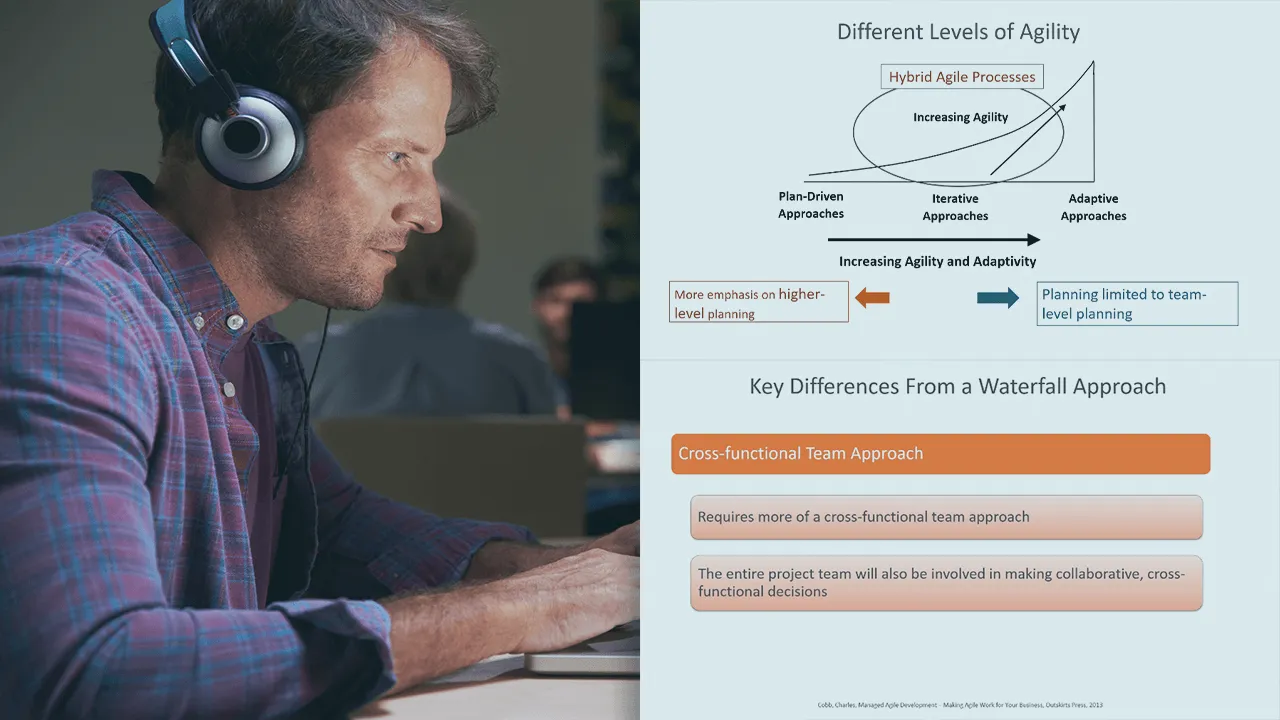
Understanding Hybrid Agile Project Management 
This course provides an overview of hybrid Agile project management, exploring the differences between traditional and Agile approaches, and the advantages and disadvantages of Defined and Empirical Process Control models. Participants will gain the skills to create a hybrid approach to fit any given situation. ▼
ADVERTISEMENT
Course Feature
![]() Cost:
Cost:
Free Trial
![]() Provider:
Provider:
Pluralsight
![]() Certificate:
Certificate:
Paid Certification
![]() Language:
Language:
English
![]() Start Date:
Start Date:
On-Demand
Course Overview
❗The content presented here is sourced directly from Pluralsight platform. For comprehensive course details, including enrollment information, simply click on the 'Go to class' link on our website.
Updated in [March 06th, 2023]
This course, Understanding Hybrid Agile Project Management, provides an overview of how to blend traditional and Agile project management approaches to create a hybrid approach that fits any given situation. Participants will learn about the differences, advantages and disadvantages of Defined and Empirical Process Control models. They will also gain an understanding of how to effectively manage uncertainty in a project, and explore frameworks and examples of how to put these ideas into practice in the real-world.
The course begins by introducing the concept of hybrid Agile project management and the differences between Defined and Empirical Process Control models. Participants will learn about the advantages and disadvantages of each model, and how to select the right model for a given project.
Next, the course will cover how to effectively manage uncertainty in a project. Participants will learn about the different types of uncertainty, and how to identify and manage them. They will also learn about the importance of communication and collaboration in managing uncertainty.
The course will then explore frameworks and examples of how to put these ideas into practice in the real-world. Participants will learn about the different types of hybrid Agile approaches, and how to select the right approach for a given project. They will also learn about the importance of monitoring and controlling the project, and how to use metrics to measure progress.
Finally, the course will conclude with a discussion of the importance of continuous improvement and how to use feedback to improve the hybrid Agile approach. Participants will learn about the different types of feedback, and how to use it to improve the project.
By the end of this course, participants will have the skills and knowledge of Hybrid Agile Project Management needed to understand how to fit a hybrid Agile approach to the nature of any project. They will be able to select the right model for a given project, manage uncertainty, and use feedback to continuously improve the project.
[Applications]
Upon completion of this course, learners will be able to apply the concepts of Hybrid Agile Project Management to their own projects. They will be able to identify the differences between Defined and Empirical Process Control models, and understand the advantages and disadvantages of each. Learners will also be able to effectively manage uncertainty in a project, and be able to select the right approach for any given situation. Finally, learners will be able to apply frameworks and examples to put these ideas into practice in the real-world.
[Career Paths]
Recommended Career Paths:
1. Agile Project Manager: Agile Project Managers are responsible for leading and managing Agile projects. They are responsible for developing and implementing Agile project plans, managing resources, and ensuring that projects are completed on time and within budget. They must also be able to effectively communicate with stakeholders and team members to ensure that projects are successful. The demand for Agile Project Managers is increasing as more organizations are adopting Agile project management approaches.
2. Hybrid Agile Project Manager: Hybrid Agile Project Managers are responsible for leading and managing hybrid Agile projects. They must be able to blend traditional and Agile project management approaches to create a hybrid approach that fits the needs of the project. They must also be able to effectively communicate with stakeholders and team members to ensure that projects are successful. The demand for Hybrid Agile Project Managers is increasing as more organizations are adopting hybrid Agile project management approaches.
3. Agile Coach: Agile Coaches are responsible for helping teams and organizations adopt Agile project management approaches. They must be able to provide guidance and support to teams and organizations as they transition to Agile. They must also be able to effectively communicate with stakeholders and team members to ensure that projects are successful. The demand for Agile Coaches is increasing as more organizations are adopting Agile project management approaches.
4. Agile Consultant: Agile Consultants are responsible for providing advice and guidance to organizations on how to best implement Agile project management approaches. They must be able to provide guidance and support to teams and organizations as they transition to Agile. They must also be able to effectively communicate with stakeholders and team members to ensure that projects are successful. The demand for Agile Consultants is increasing as more organizations are adopting Agile project management approaches.
[Education Paths]
Recommended Degree Paths:
1. Bachelor of Science in Project Management: This degree program provides students with the skills and knowledge needed to effectively manage projects in a variety of industries. Students learn about the principles of project management, including planning, budgeting, scheduling, and risk management. They also learn about the different approaches to project management, such as Agile, Waterfall, and hybrid Agile. This degree is becoming increasingly popular as organizations recognize the need for project managers who can effectively manage projects in a variety of contexts.
2. Master of Science in Agile Project Management: This degree program provides students with the skills and knowledge needed to effectively manage projects using Agile methods. Students learn about the principles of Agile project management, including iterative development, customer collaboration, and continuous improvement. They also learn about the different approaches to Agile project management, such as Scrum, Kanban, and Lean. This degree is becoming increasingly popular as organizations recognize the need for project managers who can effectively manage projects using Agile methods.
3. Master of Science in Hybrid Agile Project Management: This degree program provides students with the skills and knowledge needed to effectively manage projects using a hybrid Agile approach. Students learn about the principles of hybrid Agile project management, including blending traditional and Agile project management approaches to create a hybrid approach to fit any given situation. They also learn about the different approaches to hybrid Agile project management, such as Defined and Empirical Process Control models. This degree is becoming increasingly popular as organizations recognize the need for project managers who can effectively manage projects using a hybrid Agile approach.
4. Doctor of Philosophy in Project Management: This degree program provides students with the skills and knowledge needed to effectively manage projects in a variety of contexts. Students learn about the principles of project management, including planning, budgeting, scheduling, and risk management. They also learn about the different approaches to project management, such as Agile, Waterfall, and hybrid Agile. This degree is becoming increasingly popular as organizations recognize the need for project managers who can effectively manage projects in a variety of contexts.
Course Provider

Provider Pluralsight's Stats at AZClass
Pluralsight ranked 16th on the Best Medium Workplaces List.
Pluralsight ranked 20th on the Forbes Cloud 100 list of the top 100 private cloud companies in the world.
Pluralsight Ranked on the Best Workplaces for Women List for the second consecutive year.
AZ Class hope that this free trial Pluralsight course can help your Agile skills no matter in career or in further education. Even if you are only slightly interested, you can take Understanding Hybrid Agile Project Management course with confidence!
Discussion and Reviews
0.0 (Based on 0 reviews)
Explore Similar Online Courses

Marketing Design with Easil

Learning GraphQL

Python for Informatics: Exploring Information

Social Network Analysis

Introduction to Systematic Review and Meta-Analysis

The Analytics Edge

DCO042 - Python For Informatics

Causal Diagrams: Draw Your Assumptions Before Your Conclusions

Whole genome sequencing of bacterial genomes - tools and applications

Lean-Agile Mindset for Leaders

CSM Certification Study Guide - Certified Scrum Master

Agile & Scrum Training
 Related Categories
Related Categories
Quiz
 Submitted Sucessfully
Submitted Sucessfully
1. What is the main purpose of this course?
2. What are the two types of process control models discussed in this course?
3. What is the most important factor in selecting the right approach?


Start your review of Understanding Hybrid Agile Project Management